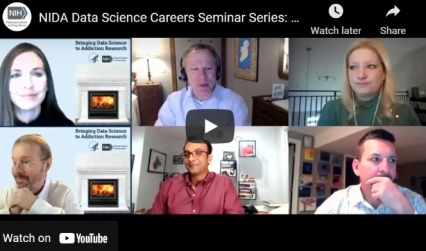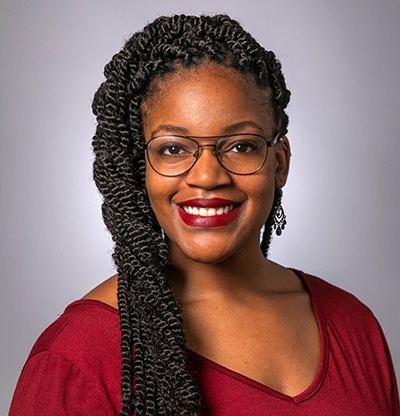What’s New at NIDA
Bringing Data Science to Addiction Research

Did you know NIDA hosted a 4-part Data Science Careers Seminar Series in the Spring of 2021? The goal of this seminar series was to highlight the career paths of prominent data scientists and inspire a new generation of data science researchers to focus on addiction research. If you happened to miss it, you are in luck because the series was recorded! See below for links to each recording.
- March 15, 2021 – 9:00-10:30am EDT - Fireside chat with Dr. DJ Patil – Details and Recording.
- March 22, 2021 – 9:00-10:30am EDT - Session two - Speakers Dr. Kirk Borne and Dr. Martin Paulus – Details and Recording
- March 29, 2021 – 9:00-10:30am EDT - Session three – Speakers Dr. Kristian Lum and Dr. Brenda Curtis – Details and Recording
- April 5, 2021 – 9:00-10:30am EDT - Session four – Speakers Dr. Mike Tamir and Dr. Dan Jacobson - Details and Recording
Request for Information
Access and Use of Data from the Adolescent Brain Cognitive Development (ABCD) Study
The NIH wants to hear from you! The ABCD Study, launched in 2015, is the largest long-term study of brain development and child health in the United States, collecting a broad range of data from nearly 12,000 youth and their parents/caregivers beginning at ages 9 and 10. The purpose of this Request for Information (RFI) is to invite comments and suggestions on access and use of data from the Adolescent Brain Cognitive Development (ABCD) Study, a population-based observational research initiative on child and adolescent health and development.
Funding Opportunities and Program Updates
Notice of Special Interest (NOSI): NIH Research Project Grant (R01) Applications from Individuals from Diverse Backgrounds, Including Under-Represented Minorities FOA: NOT-DA-21053
The National Institute on Drug Abuse (NIDA) is now participating in NOT-NS-21-049. This NOSI utilizes the NIH parent R01 announcement to encourage Program Director(s)/Principal Investigator(s) (PD(s)/PI(s)) from diverse backgrounds to conduct and contribute to the research areas of NIDA. The long-term goal of this effort is to enhance diversity in the biomedical research workforce. For direct inquiries please contact Dr. Susan Weiss.
Notice of Special Interest (NOSI): Administrative Supplements to Support Research on Health Equity in NIDA-funded Grant Awards
This notice is intended to alert the research community to NIDA's interest in receiving administrative supplement requests to incorporate goal-oriented research enhancements to contribute to the body of knowledge on reducing disparities in substance use and related consequences such as HIV. Applications to this NOSI must highlight one or more research aims enhancing their current project to contribute to the literature on health equity or health disparities. See NOT-DA-21-044 for more information.
Notice of Special Interest (NOSI): Administrative Supplements to support engagement of functionally diverse teams to advance ongoing NIDA-funded research
The purpose of this program is to support pilot research that will catalyze formation of functionally diverse research teams through sustainable partnerships between a) historically NIDA-funded research programs and institutions and b) institutions or programs that have a historical and central mission to promote racial and ethnic equity through science and engineering research and education. See NOT-DA-21-045 for more information.
For more information about NIDA's efforts to address Racial Equity in research, see Racial Equity Initiative - Research Gaps and Opportunities Workgroup | National Institute on Drug Abuse (NIDA). For more information on NIH's efforts related to Health Equity in research, see Investigating Health Disparities | National Institutes of Health (NIH).
RCMI Pilot Research Project
The National Institute on Drug Abuse (NIDA) has partnered with NIMHD to provide supplemental funding for RCMI pilot research projects led by early-stage investigators (ESIs) conducting substance use, addiction, and related neuroscience research. See NOT-MD-21-022 for details.
Supplement applications must be submitted through PA-20-272, Administrative Supplements to Existing NIH Grants and Cooperative Agreements (Parent Admin Supp Clinical Trial Optional). Applications are due on June 15th, 2021. The scientific contacts for this funding opportunity are Drs. Angela Holmes (NIDA) and Nadra Tyus (NIMHD). See NOT-MD-21-022 for details.
Career Development Spotlight: Dr. Lillian Brady

The NIDA ORTDD is delighted to introduce Dr. Lillian Brady, a new NIDA Mosaic K99/R00 Scholar. Dr. Brady is an Academic Pathways Postdoctoral Research Fellow at Vanderbilt University in the Department of Pharmacology in Nashville TN. We had the opportunity to interview Dr. Brady and are excited to share some of her background and journey with our research training community.
- At what point in your life did you know you wanted to become a scientist? What drew you to the STEM field and particularly substance use/addiction research?
The idea of becoming a scientist and doing research as a career was not introduced to me until I attended HBCU Alcorn State University in Mississippi. As an undergraduate chemistry major we were required to do summer internships and I was able to participate in a variety of different research experiences in several STEM fields. I knew I wanted to become a scientist after these research experiences. I was introduced to Neuroscience research in graduate school at UAB through the 1st year laboratory rotations and then became interested in the pharmacodynamics of medications on brain activity in my graduate lab. My current postdoctoral position was where I became particularly interested in substance use/addiction research. - Were there any events or individuals who inspired you throughout your professional journey?
The direct mentorship and sponsorship I have received throughout my academic journey from faculty within the Chemistry and Physics department at Alcorn State University to my graduate and postdoctoral mentors, gave me the encouragement I needed to pursue a PhD and continue in academic research. Participation in the NIH Roadmap Scholars Program at UAB led by Dr. Farrah Lubin and Dr. Lori McMahon was instrumental in my pursuit of a postdoctoral position. - What advice would you give to other postdocs who are considering the mosaic K99/R00 mechanism?
To other post docs considering the MOSAIC K99/R00, do not be afraid to ask for help and have people from different STEM fields read your grant before submitting. Also, the Career goals and objectives section is just as important as the research strategy section. Be specific in your training needs and make sure the statement(s) from your mentor(s) align with your short and long-term career goals. - What was the best and worst career advice you have received during your journey of becoming a scientist?
The best career advice I received was not to self-eliminate. Writing a grant of this magnitude is a daunting task, especially when you have little to no experience with writing NIH style grants as I did. I quit (in my mind) while writing several times, lol. “You miss 100% of the shots you don’t take,” so apply for whatever you are eligible for. The worst career advice I received was to be pre-med in undergrad and to go to medical school just because I did well in and enjoyed my science classes. I was not exposed to scientific research as a career growing up, and culturally an interest in science is associated with the medical profession more often than research. I spent a lot of time and money pursuing that route when exposure to potential research careers at an earlier age would have saved me the stress I endured taking the MCAT and applying to medical school. - What has been the most challenging obstacle you have had to face throughout your journey to becoming an addiction scientist and what have you done to push through?
The most challenging obstacle I have had to face throughout my journey is overcoming a lack of self-confidence. Microaggressions and feeling like I did not belong in academia took a toll on my confidence, causing me to be reluctant to ask for help and communicate my needs. Rebuilding my confidence is a daily journey, but everything started falling in place when I began to take my mental health seriously and started going to therapy. - Is there anything else that you would like to share with the NIDA community about your inspiring journey?
I am excited to be a part of the NIDA community and I look forward to networking with and learning from the vast array of amazing NIDA researchers.
Learn more about the Mosaic K99/R00 mechanism.
CALLING ALL NIDA R25 APPLICANTS! NIDA is accepting applications for our R25 programs!
NIDA has four R25 Funding Opportunity Announcements: PAR-20-236, PAR-21-168, PAR-19-258, PAR-19-207, each with a different research focus. The overall purpose of the R25 program is to support research education activities that: (a) Complement and/or enhance the training of a workforce to meet the nation’s biomedical, behavioral and clinical research needs; (b) Enhance the diversity of the biomedical, behavioral and clinical research workforce; (c) Help recruit individuals with specific specialty or disciplinary backgrounds to research careers in biomedical, behavioral and clinical sciences; or (d) Foster a better understanding of biomedical, behavioral and clinical research and its implications. Learn more about this mechanism and see NIDA (R25) Active Awards. Congratulations to NIDA Research Education Program (R25) Awardees in Fiscal Year 2021!
What’s to Come
Planning to apply for the NIH Blueprint and BRAIN Initiative Diversity Specialized Predoctoral to Postdoctoral Advancement in Neuroscience (D-SPAN) Award (F99/K00)? A Pre-Application Technical Assistance Webinar will take place on Tuesday, June 29, 2021 from 2:00-3:00 pm EDT. Prospective applicants are required to pre-register in advance.
This webinar will guide through the process of putting together an application for the NIH Blueprint and BRAIN Initiative Diversity Specialized Predoctoral to Postdoctoral Advancement in Neuroscience (D-SPAN) Award for RFA-NS-21-012. The webinar will go through each part of the application, including eligibility, specific aims and research strategy, sponsor and co-sponsor information, letters of reference and support, and other documents.
Did You Know?
The NIH RePORT and RePORTER have been updated! The NIH RePORT provides access to reports, data, and analyses of NIH research activities, including information on NIH expenditures and the results of NIH supported research. It is now easier, simpler, and quicker to access the vast amount of information these tools offer with the new site. Learn more about what’s new.
NIH Anti-Harassment
The National Institutes of Health (NIH) does not tolerate pervasive or severe harassment of any kind, including harassment, whether it is within the agency, at research organizations that receive NIH funding, or anywhere else NIH-funded activities are conducted. Only in safe and respectful work environments can individuals achieve their greatest potential and carry out the important work that supports the NIH mission. To foster a work environment free from harassment, NIH bolsters policies, guidelines, requirements, and communications to make our expectations clear to the NIH workforce and NIH-funded organizations, and to take appropriate actions within our authority. See resources and other helpful information on harassment.
COVID-19 Updates
The COVID-19 pandemic is a rapidly evolving situation. Visit the Coronavirus Disease 2019 (COVID-19): Information for NIH Applicants and Recipients of NIH Funding webpage for the latest information and guidance about programs in place to help with NIH projects. This webpage provides information about proposal submission, award management, human subjects, clinical trials, animal welfare, peer review, and lists funding opportunities related specifically to COVID-19. We encourage you to check this webpage often for updates and don’t hesitate to reach out to your Program Officer or our office if you have questions.
NIDA ODHD listserv
We encourage you to subscribe to the NIDA ODHD listserv. Please spread the word about this listserv! Emails from Dr. Albert Avila, Director of the Office of Diversity and Health Disparities (ODHD), are sent out to subscribers a few times a month containing announcements about training and career development.

